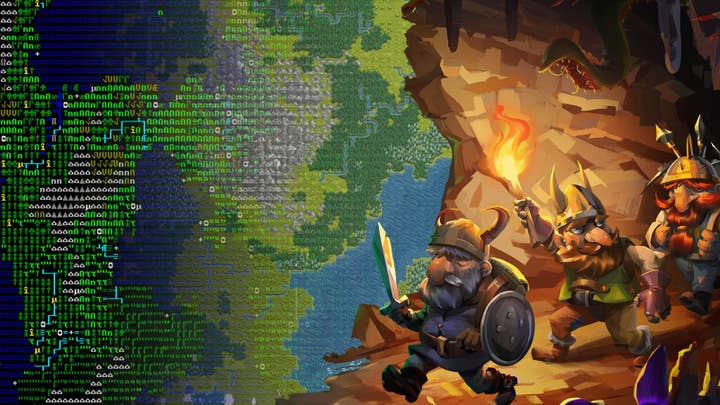Slow and steady wins the race: How Dwarf Fortress reinvented itself after 20 years
Tarn Adams chats about the title's commercial release, the winding path of the cult classic, and adjusting to a new reality where the two co-exist side-by-side
Dwarf Fortress is an oddity across the games industry.
The life's work of brothers Tarn and Zach Adams (under the name Bay 12 Games), it has been in active development since 2002.
Released in public alpha in 2006, the original Dwarf Fortress reached the status of cult classic over the years, with a dedicated, hardcore community.
With its text-based graphics, its (very) challenging learning curve, its procedurally generated world and its advanced simulation, Dwarf Fortress has been captivating players for almost two decades, and never technically came out of alpha.
Over the years, Tarn and Zach Adams have been happy with the donations-based, self-sustained model they put into place to support themselves and Dwarf Fortress, on PayPal and Patreon. And they never planned on changing it.
In an in-depth interview with the New York Times in 2011, Tarn Adams revealed that they refused a $300,000 licensing deal for the use of the Dwarf Fortress name for more commercial purposes.
But in March 2019, they announced that another version of Dwarf Fortress would release on Steam and Itch.io. Rising healthcare costs is what convinced the pair to release this paid-for, enhanced edition, which would feature modern graphics, with the support of publisher Kitfox Games.
Long story short, the bombshell announcement led to an acclaimed launch last month, with the title becoming an enormous success, selling just shy of 500,000 copies in December.
The success of Dwarf Fortress' commercial edition only emphasises the popularity that the original version has never failed to encounter over the past 17 years. But for co-creator Tarn Adams, this is a lot of changes to take in.
.png?width=720&quality=70&format=jpg&auto=webp)
When we ask him whether 20-years-ago-Tarn-Adams would be happy about what Dwarf Fortress became, he laughs and says that's the "easy part," because of course he is.
"But how I feel, though? I don't know. Am I supposed to know? There's too much going on, you know. The new programmer just started [two] weeks ago; we haven't had another programmer with their hands on the source code since I started. So I'm probably not going to be really settled on how I feel about this for another year!"
After two decades of working on his own, Adams has had to adjust to a new reality – and while he and his brother are now covered health-wise, he says it's not just about them anymore.
"We're now also paying for five or six people... I don't know, it's hard to keep track. This is what the publisher is for I think, in part. They handle the paperwork and things like that. We have at least three artists working now, still. We have some unannounced stuff so there are additional people. And then of course the programmer. None of these things are cheap. And now I talk about churn rates and stuff…"
We sarcastically joke about it being "exciting times" in a dev's life when churn rates become your reality, to which Adams replies 'no' five times over. It's pretty clear that the business aspect of releasing a commercial game isn't his cup of tea. But Dwarf Fortress is his life's work and that's worth having to put your nose in spreadsheets and strategy meetings, surely?
"We haven't had another programmer since I started [in 2002]. So I'm probably not going to be really settled on how I feel about this for another year!"
"It's not easy," he smiles. "I don't want to be complaining here since there's this PC Gamer article now showing us with champagne glasses and saying we're millionaires, which is not [true]..." He pauses before laughing: "That'll be true in February!"
"But it's a huge adjustment. It's an ongoing process because a lot of things aren't done. I haven't really added anything new, creative in the way that I'm used to, for years now, and there's gonna be another year – this year – [where] that's almost certainly going to be true. And I'm also now managing people to a partial extent.
"If you read past interviews, that was always one of the things I wasn't keen on. I don't want to be a manager. I am not a famously social person, so it didn't strike me as a job fit. You'd have to ask them, I don't want to give myself a performance review, but it's going okay. It's not my No.1 job choice but things are different now. We have to adapt...
"It does come back to the health scare, that's why we made the decision, and that's why we have to do things that we don't want to do in a sense. But I think that the end result is – in some baby sense of the word – transcendent of that. It's good. It's cool. And a lot more people are playing the game, which is just a good thing, if you think the game is worth playing."
He adds that the goal is to "try to keep the operation light enough that we can just keep going with what we have."
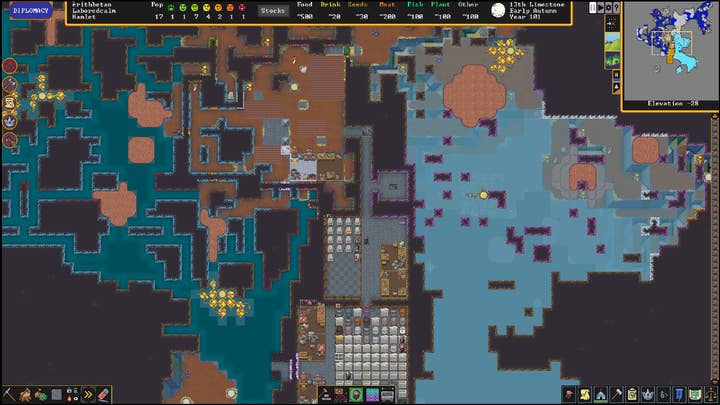
Dwarf Fortress is one of these titles where the community is deeply involved in the game's development, and the developers are deeply involved with the community. Bay 12 has always been extremely transparent and communicative about what's going on with Dwarf Fortress. The community's response to the enhanced version has been mostly positive but there were some unhappy few.
"Some people just hate the fact that there's a publisher and look for any excuse to hate [Kitfox], and treat me as some kind of victim of this process, which is absolutely ridiculous," Adams says. "But these are not many people. They're very noisy people. I've been moderating a forum thread on this topic and I have apparently sold my soul to the devil, which is interesting…"
But he reiterates that the reaction's been mostly a positive one. Some players were concerned about the lack of some historical features such as full keyboard control and map export features, "which is all just valid stuff to work through," Adams says.
"And then there's concerns about modding, and whether the Steam mod community is going to separate out from the old modding community that was on the forum," he continues. "I don't really have a feel for it yet. It's just too early to know where those things are going to go and they're all just valid concerns people have."
"I've been moderating a forum thread on this topic and I have apparently sold my soul to the devil, which is interesting…"
The community overall was very happy with the new version, Adams says, as well as "surprised that it was pretty good."
"I don't think they thought that we were capable of doing a good job," he smiles. "Because of how crappy the interface has been up to this point."
When the decision came to do a commercial version of Dwarf Fortress, accessibility was a core component of evolving the title. Which is why graphics very quickly became an obvious necessity.
"We just sat down and thought, 'What would be the best possible commercial release?' And that involves graphics! And then it's down to our capabilities, what we thought we could accomplish in a couple of years – and stuff like 3D graphics was not one of those. There's a number of games in the genre broadly speaking, and the graphic style we have more or less being top down 2D pixel graphics is acceptable.
"So basically the whole process of commercialising the game meant we really wanted to think about all of the things that were making people bounce off of it. And it's a long list. Because the text graphics are actually very bad for some people. And then the keyboard input was nonsense. There was no mouse input at all. No tutorials to speak of. People like to say, 'I pop open Dwarf Fortress and then I also have the wiki on another computer running'. And that's probably still true, but that's not a good ad for the game.
"The whole process of commercialising the game meant we wanted to think about all of the things that were making people bounce off of it"
"So we added tutorials, tool tips. We changed the flow of certain menus, completely rewrote other menus, and we even changed the AI behaviour of the dwarves in certain cases. This was just a process of trying to maximise the number of players."
But of course Bay 12 wasn't alone in this process, with Kitfox helping out. While a few other indie publishers approached the Dwarf Fortress devs, "Kitfox made the most sense among those," Adams says.
"Our issue was that we needed somebody who would be willing to do things that most publishers don't have to go out of their way to do, like hiring artists. Usually, the developer brings the developers, and we were not," he laughs.
"And we also didn't want to get into some kind of 90/10 arrangement with somebody, so whoever we were gonna work with would have to understand that we were, in fact, actually bringing quite a lot to the table without those things. Tanya [X. Short, Kitfox's co-founder and creative director] was that person. We basically have an 80/20 deal in our favour but they get all the costs back, of course. So they handled all of the artists, [and] the production of the amazing soundtrack."
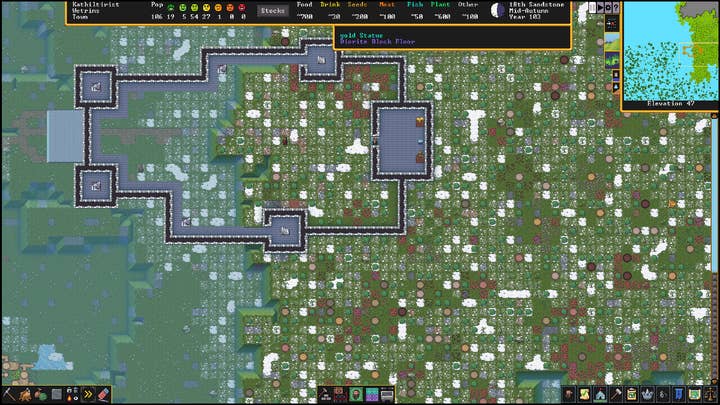
Deciding on Dwarf Fortress' visual identity was another mammoth task. We ask Adams if there was anything that surprised him in the artists' visual interpretation. He mentions having to throw out a chunk of artwork that was too "loose," but adds that "surprise" probably isn't the right word generally.
"The rest of it has just been delightful the whole time. Mike Mayday was the original artist that did the dwarves and those have just the right look we were looking for. And they were modded on the game originally, which is kind of a theme here.
"All of the artists but one were either hardcore modders or just tile set creators, who had already made tile set mods for Dwarf Fortress, or were players before and played for a long time. They all knew what the game's like, what the general vibe of the game is, that there's a balance of depression and inebriation that needs to be captured. And they did a great job."
He describes interesting challenges though, like ramps, which allow movement between levels.
"The game has a really uncommon sort of three-dimensional slice aspect to it, that other games either just avoid, or they do the more 2D side scrolling thing, or they attempt what we're doing and run into similar problems, which is just how to draw these things.
"It's so slow to meticulously solve a problem like that, and do so many different iterations"
"And I think our giant ramp tile set is working pretty [well]. That was an intriguing problem to work through… It's so slow to meticulously solve a problem like that, and do so many different iterations. And we're happy with how it turned out."
Trees were another challenge. Dwarf Fortress features quite a variety of trees (real or invented), which are generated depending on various biome options and can produce a wealth of different fruits, leaves, flowers, and other "growths." There are a lot of moving parts to them as an in-game object.
"We have annoying restrictions that we place on the artist," Adams says. "The tree has to exist in a tile, obviously the pieces of the tree exist in the tile, but not only that, the type of piece that's in a tile is important. Like whether it's a thick branch or a trunk or some twigs with fruit on them, or are the leaves there, are they not...
"And the code determines where those things are. And it's more complicated than a Minecraft tree where you have just a block of trunk or a block of leaves. Because the connectivity is important, the direction that they connect... It's just everything.
"There's just a lot of information and it might not line up with what the artists want to draw for an oak tree or something. And they don't even get to really interpret oak broadly in an oaky way. They're like 'this is an oak chunk that connects in a certain direction' and so forth. Carolyn [Jong] did those starting from a template that Mike had created long before. And they're just above and beyond what I would have conceptualised as being possible with those restrictions. So that's why we have artists!"
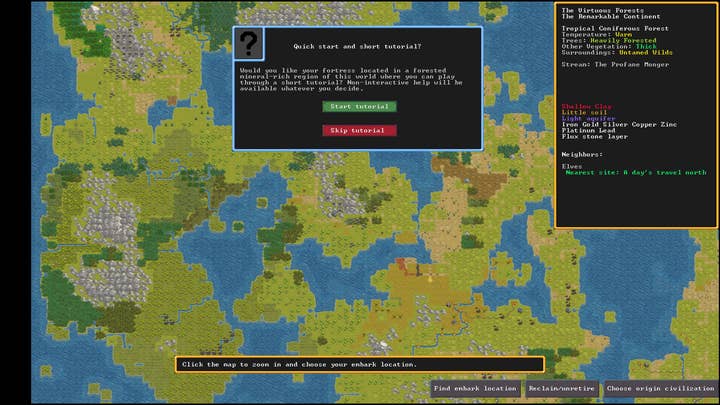
Bay 12 is now in the interesting situation of having the original, free version of Dwarf Fortress still running alongside the commercial game. Adams mentions that the historical community continued to support them while they were going through the development of the enhanced edition, which he is very grateful for. But he admits that having both versions was "kind of a concern at the beginning," when they announced the project.
"We wanted to explain to [the community] clearly, in our announcement, why we were doing it, and reassure people that they wouldn't really be losing anything, [that] there was still gonna be a free version, which is, of course, a very [uncommon thing]. But also there's a feature parity, right? The mechanics in one are the same as the mechanics in the other."
For Bay 12, it was all about figuring out how to maintain their existing community while taking "this huge side track off into graphics-land that [was] going to fundamentally change what the community is, how it relates to us, [and] how we're financially supported," Adams explains. And having the two versions peacefully coexisting was the solution they came up with.
"The first phase is catching up, and because adventure mode is in there, maybe that'll take this year to finish..."
"It's been [50] days and so far, so good. Like I said we haven't got the money yet so it's good that people continue to support us. There's been some expectable drop off in the Patreon numbers and that's perfectly fine. People have other things to spend money on and we're not the perfect fit for that now because we're doing okay. It makes a lot of sense to switch your support to other people."
Concluding our chat, we ask Adams about what's ahead. He details a whole content map: adventure mode, improving the graphics, adding missing keyboard input and map export features.
"The first phase is catching up, and because adventure mode is in there and adventure mode is an entire game with its own 90 screens, that's gonna be... Yeah, maybe that'll take this year to finish.
"And then the current plan – and it seems like a reasonable plan but we're in a whole new environment now and so we'll have to react – was just to go back to what we were doing."
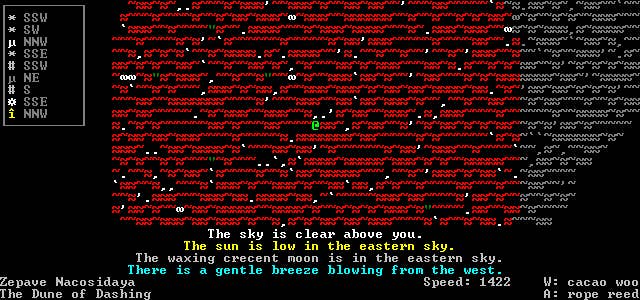
Bay 12 shared at the end of December that going forward updates would see simultaneous releases across Steam, Itch.io, and the classic version. The studio is still adjusting to having a released title on Steam though, and Adams says that sales and DLC are things that he doesn't like the idea of.
"It's very early yet to know what the tail looks like in that kind of thing, and how adventure mode's gonna work, and what a sale is. We've not done a sale. What is a sale? A Dwarf Fortress 75% off sale is never gonna make sense."
Prior to the enhanced edition announcement, Bay 12 was working on a villain update, artefact heists, army and siege improvements, myth and magic aspects, and way more. So it's very much going back to business as usual, we suggest.
"There's no real reason to change it now except any reason that may come up"
"Yes! There's no real reason to change it now except any reason that may come up," Adams smiles. "Who knows, right? It's really hard to tell with what's going on with the people that we have on now. The programmer's already updating our graphics engine forward a dozen years. So that kind of thing is [part] of this multi-year process I described, there's going to be a multi-year process with them, this includes things like Mac and Linux ports, I believe, which previously the community had worked on."
He describes issues with Mac and Linux versions for a bit, before interrupting himself with a laugh, and concluding: "I don't know what's going on, but these things will be magically fixed by people who know what they're doing. It's the power of commerce…"
